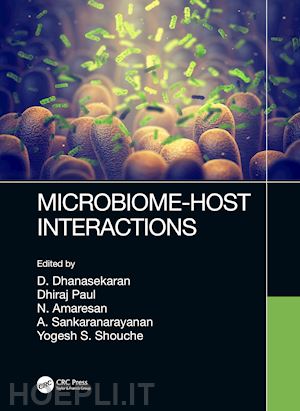D. Dhanasekaran is an Associate Professor in the Department of Microbiology, School of Life Sciences, Bharathidasan University, Tiruchirappalli, India. He has experience in the fields of actinobacteriology and mycology. His current research focuses on microbiome profiling of actinorhizal root nodules, lichen, poultry gut, and cattle reproductive system. He was awarded UGC-Raman Postdoctoral Fellowship and worked in the Department of Molecular, Cellular, and Biomedical Sciences at the University of New Hampshire, Durham, USA. He has qualified the Tamil Nadu State Eligibility Test (SET) for Lectureship in Life Science. He has deposited around 106 nucleotide sequences and 7 metagenome sequences; drafted genome sequence of Blastococcus sp. CT_GayMR20 in GenBank and five bioactive compounds in PubChem; and published 105 research and review articles—including one paper in Nature Group Journal Scientific Report—and 23 book chapters. He has an h-index of 25 with total citations of 1995 as per Google Scholar. He has edited seven books on Antimicrobial Compounds: Synthetic and Natural Compounds, Microbial Control of Vector Borne Diseases, Fermented Food Products, CRC Press, Taylor & Francis Group, New York, Fungicides for Plant and Animal Diseases, Actinobacteria: Basics and Biotechnological Applications, Algae-Organisms for Imminent Biotechnology, Microbial Biofilms – Importance and Applications under in-tech open access publisher Eastern Europe. He has guided 12PhD candidates and organized several national-level symposia, conference, and workshop programs. He has received research funding from the Department of Biotechnology, University Grant Commission, Indian Council for Medical Research and International Foundation for Science, Sweden; International Society for Microbial Ecology, The Netherlands; and Tamil Nadu State Council for Science and Technology. He is a member of the American Society for Microbiology, North American Mycology Association, Mycological Society of India, National Academy of Biological Sciences, Society for Alternatives to Animal Experiments, and a member of several editorial boards in national, international journals, doctoral committee member, board of study member in microbiology, and reviewer in the scientific journals and research grants. As per the reports of Indian Journal of Experimental Biology, 51, 2013, Dr. Dhanasekaran is rated second among the top five institutions in the field of actinobacteria research in India. Dhiraj Paul is a Scientist at the National Center for Microbial Resources (NCMR-NCCS), Pune. Previously, he was a scientist (DST, Govt. of India Fast-track fellowship) at the Microbial Ecology Laboratory, NCCS, Pune, India. He earned a PhD at the Environmental Microbiology Laboratory, Department of Biotechnology, IIT Kharagpur, India. He has published his findings in reputed journals such as mSystems, AEM, Bioresource Technology, PLOS One, Geomicrobiology, Water research, Frontiers in Microbiology, and Microbiology. He also edited the books and authors of a number of book chapters of CRC Press and Springer. He has expertise in microbial ecology, geomicrobiology, microbial diversity, and metagenomics. He has received an AMI Young Scientist Award, DST Young Scientist, and a number of fellowships (CSIR, GATE, DBT) in life sciences. Presently, he is working on microbial ecology of hypersaline Lonar Lake ecosystem, deep biosphere, and human microbiome using multiomics approaches. N. Amaresan is an Assistant Professor at C.G. Bhakta Institute of Biotechnology, Uka Tarsadia University, Gujarat. He has over 15 years of experience in teaching and research, and made several original and novel discoveries, especially in various allied fields of microbiology, mainly plant–microbe interactions, bioremediation, plant pathology, and others. For his original discoveries on agriculturally important microorganisms, he has received Young Scientist Awards by Association of Microbiologists of India and National Academy of Biological Sciences. He was also awarded a visiting scientist fellowship from National Academy of India to learn advanced techniques and Early Career Research Award by Department of Science and Technology, Government of India. He has handled many funded projects sponsored by DST, DBT, GEMI, etc. He has published more than 70 research articles and books of national and international repute. He also deposited over 500 bacterial 16S rDNA and fungal ITS rDNA sequences in the GenBank (NCBI, EMBL, and DDBJ), and also preserved over 150 microbial germplasms in various culture collection centers of India. A. Sankaranarayanan has been associated since 2015 with C.G. Bhakta Institute of Biotechnology, Uka Tarsadia University, Surat of Gujarat State of India. He has experience in the fields of fermented food products and antimicrobial activity of herbal and nanoparticles against pathogens. His research focuses on microbes in fermented food products and removal of bacteria from foo











